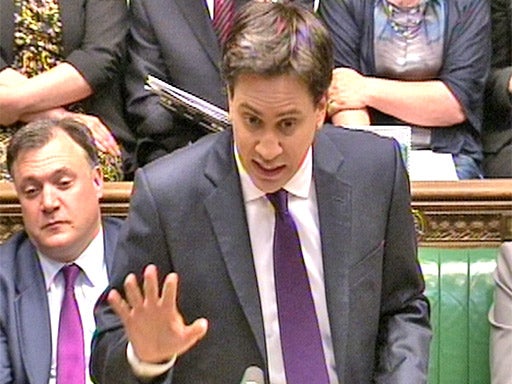'PM is dragging his feet on bank reform': Labour on attack as bonuses leap to record level
Labour accuse Cameron of giving 'massive tax cut' to millionaires at a time when ordinary families are seeing their incomes shrink

Your support helps us to tell the story
From reproductive rights to climate change to Big Tech, The Independent is on the ground when the story is developing. Whether it's investigating the financials of Elon Musk's pro-Trump PAC or producing our latest documentary, 'The A Word', which shines a light on the American women fighting for reproductive rights, we know how important it is to parse out the facts from the messaging.
At such a critical moment in US history, we need reporters on the ground. Your donation allows us to keep sending journalists to speak to both sides of the story.
The Independent is trusted by Americans across the entire political spectrum. And unlike many other quality news outlets, we choose not to lock Americans out of our reporting and analysis with paywalls. We believe quality journalism should be available to everyone, paid for by those who can afford it.
Your support makes all the difference.Bankers’ bonuses leapt to record levels in April as the Government’s cut in the top rate of income tax came into effect, new figures reveal.
The disclosure provoked anger with Labour accusing David Cameron of giving a “massive tax cut” to millionaires in the City at a time when ordinary families are seeing their incomes shrink.
According to the Office for National Statistics, the average weekly bonus in the financial sector was £143 in April – a rise of 64.4 per cent compared with April 2012.
The dramatic rise came against a background of falls in bonuses over the last year, suggesting recipients had been delaying collecting them to minimise the amount of tax paid on their windfalls.
The surge in bonus payments could also have cost the Treasury tens of millions of pounds in last tax revenues. The figures cover people working in banking, insurance, pensions and other financial institutions.
George Osborne announced in last year’s Budget that the top rate of tax, levied on earnings of more than £150,000, would drop from 50p to 45p in the financial year which started on 6 April.
The ONS said some businesses had told it that they were deferring bonuses normally paid in March to April.
Only once since January 2000, when the monthly figures were first compiled, has the average weekly payment topped £100 – in December 2006 when end-of-year bonuses took the average to £107.
In angry Commons exchanges, Ed Miliband, the Labour leader, said: “The fact is that bonuses in the City were up by 64 per cent in April – and why? Because the Prime Minister has cut the top rate of income tax from 50p to 45p. People took their bonuses in April and were given a massive tax cut as a result.”
He added: “For all his tough talk, the reality is the Prime Minister is dragging his feet on banking reform. Business lending is still falling, bonuses are rising and while ordinary families are suffering, he is giving a massive tax cut to the bankers.”
Mr Cameron replied that City bonuses would be 85 per cent lower in 2012-13 than they were in 2005-08 when Mr Miliband and Ed Balls, the shadow Chancellor, were working in the Treasury.
He told the Labour leader: “It does not matter what you say. You cannot get over the fact that they presided over boom and bust, the collapse of the banks and the failure to regulate.”
Mr Cameron said: “They cannot hide their dreadful record and they ought to start with an apology.”
Earlier in the year Goldman Sachs raised the idea of deferring bonuses to April to minimise staff tax liabilities.
It abandoned the move after Sir Mervyn King, the Bank of England governor, condemned the plan as “depressing” and warned bankers against misjudging the public mood.
At the time a senior City adviser told the Independent he would be “absolutely amazed” if financial institutions did not delay bonus payments until April to take advantage of the lower tax rate.
The TUC’s general secretary, Frances O’Grady, said yesterday: “For all the talk about cracking down on tax dodging, it is clear that George Osborne was in league with top bankers to ensure they could get round the 50p tax rate by changing the date when their bonus was paid.
“If there is to be no effective cap on bonuses, then we should at least ensure the public purse benefits to the full by effectively taxing every bonus and salary hike enjoyed by super-rich bankers.”
Join our commenting forum
Join thought-provoking conversations, follow other Independent readers and see their replies
Comments